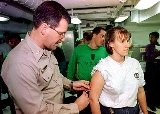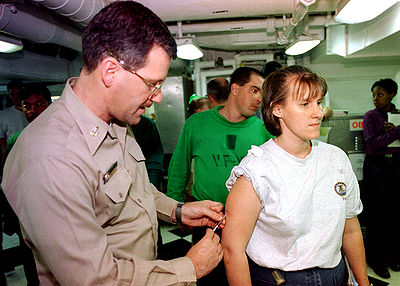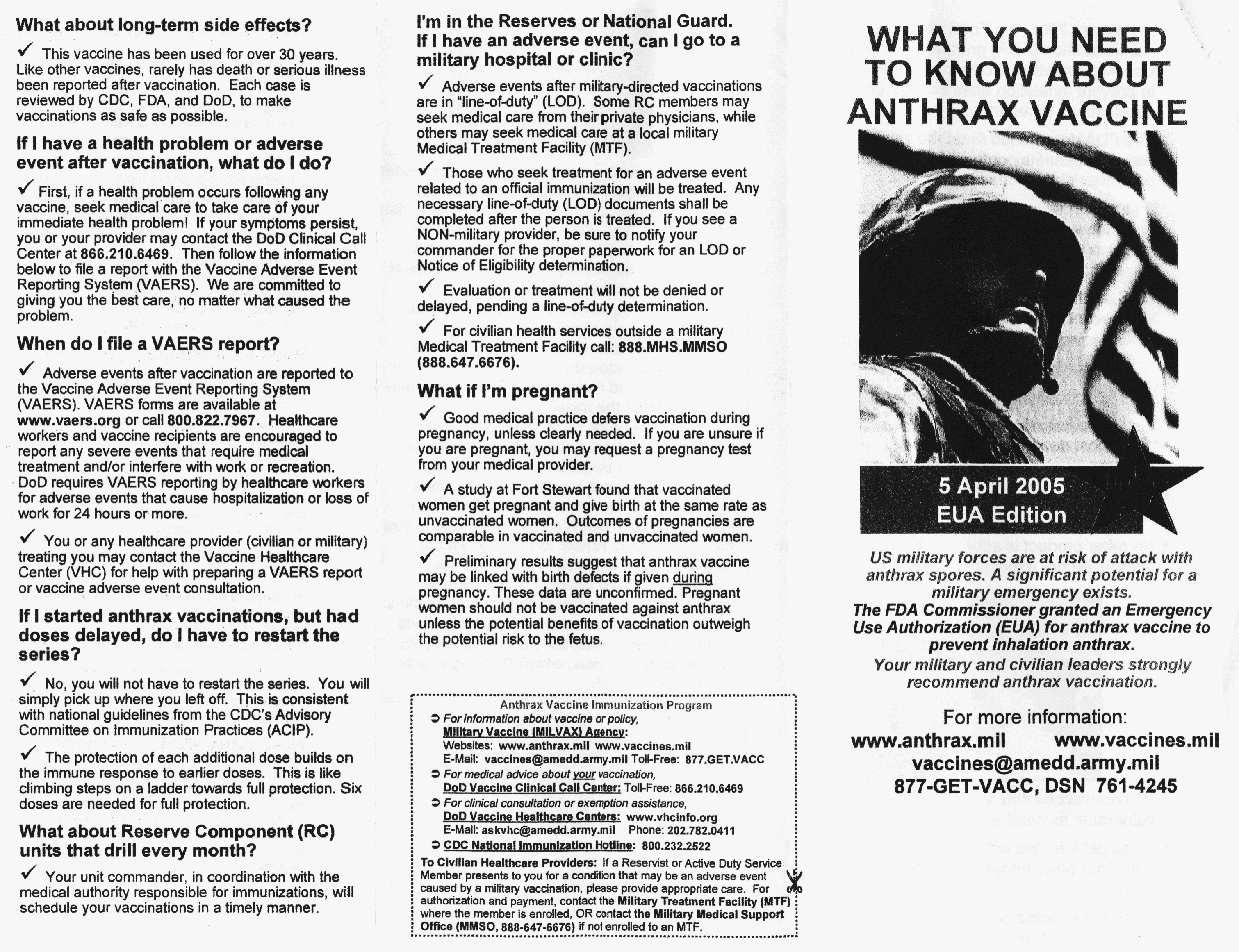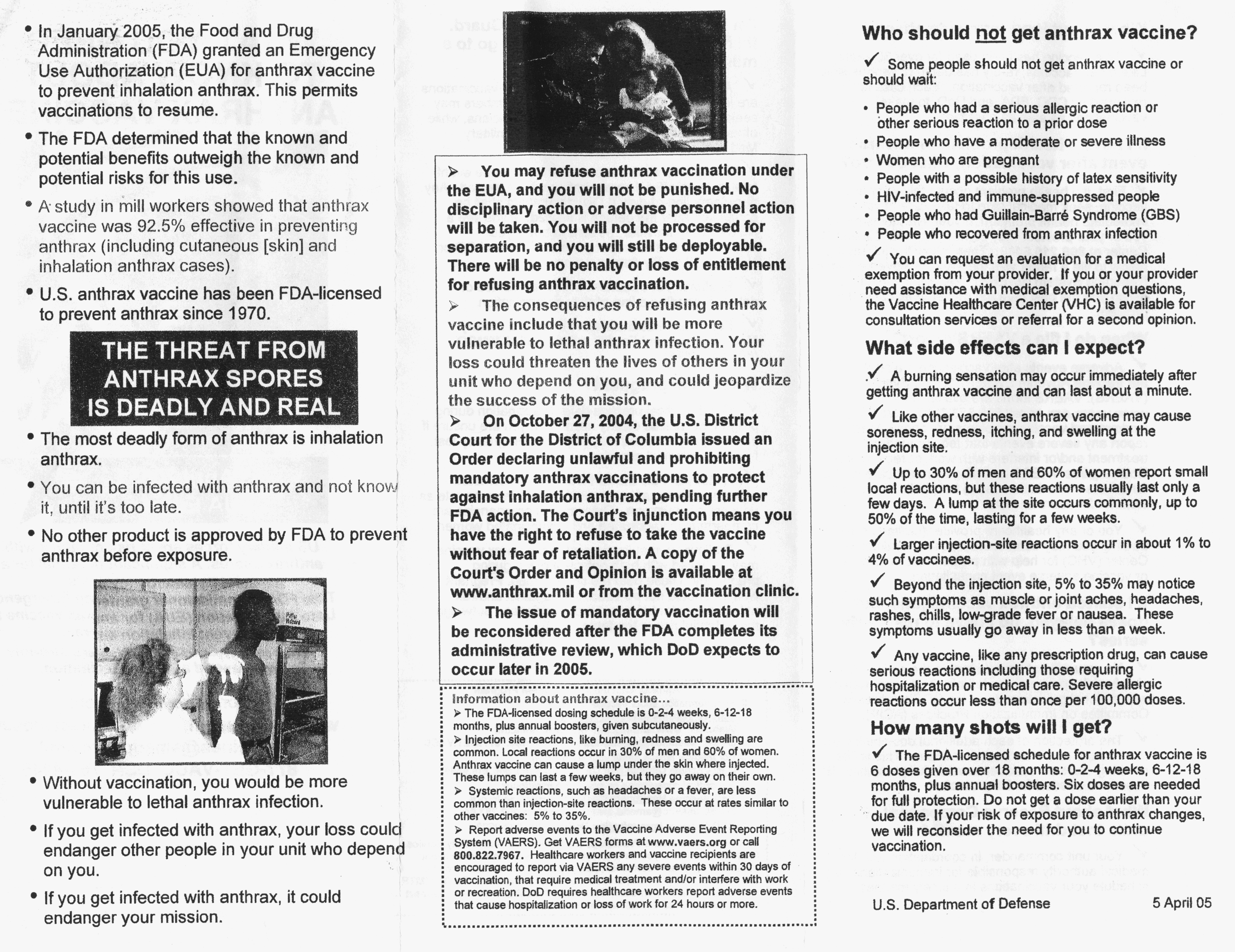
Anthrax Vaccine Immunization Program
Encyclopedia
The Anthrax Vaccine Immunization Program (AVIP), is the name of the policy set forth by the Federal government of the United States
to immunize its military
and specific civilian personnel with the anthrax vaccine
. It began in earnest in 1997 by the Clinton administration. Thereafter it ran into Food and Drug Administration (FDA) and judicial obstacles (mainly concerning the methods and viability of the vaccine manufactured by BioPort, a subsidiary of Emergent BioSolutions
Inc.).

On October 15, 2001 military members filed a FDA Citizen Petition highlighting the fact that the license for anthrax vaccine adsorbed (AVA) had never formally been finalized by the FDA in accordance with the requirements of 21 CFR § 10.30 as Docket # 01P-0471. The Petition was later utilized as the foundational basis for a Preliminary Injunction by a Federal Court to temporarily halt the program [Doe v. Rumsfeld, 297 F. Supp. 2d 119 (D.D.C. 2003)].
On June 28, 2002, in the wake of the 2001 anthrax attacks
and leading up to the 2003 invasion of Iraq
, all military personnel were required to get anthrax vaccination (in addition to their other vaccinations of smallpox
and other diseases and viruses like Japanese encephalitis, Pneumococcal, Tetanus, among others.
In December 2003, Judge Emmet G. Sullivan of the United States District Court in Washington ruled that the Department of Defense could not force military personnel to take the vaccine unless through a special order by the president.
In October 2004, for about 8 days in (October 20–28), anthrax vaccinations were resumed, but then an injunction against mandatory vaccination was filed on the basis that the BioPort Anthrax Vaccive Absorbed (AVA) was not proven to work against inhalation anthrax. The ruling held that the mandatory program was illegal. The DoD was now required to either let the individual member choose under an informed consent policy, or allowed the president to bypass this requirement by executive order (Doe v. Rumsfeld, 341 F. Supp. 2d 1, 6 (D.D.C. 2004)). For military members who had started the vaccination (which usually takes build-up and booster shots), they tended to continue the vaccination program under informed consent. For those who had a choice, they usually decided against it.
Deborah Funk, July 25, 2005. The government stated that they will resume the vaccination program under informed consent in April 2005.
On December 15, 2005, the FDA re-issued a Final Rule & Order on the license status of the anthrax vaccine, clearing the way for mandatory vaccination reinstatement. After reviewing extensive scientific evidence and carefully considering comments from the public, the FDA again determined that the vaccine is licensed for the prevention of anthrax, regardless of the route of exposure. Pertaining to the previous ruling, the DC District Federal Appeals Court declined to vacate or overturn the injunction in 2006, instead mooting the case based on the FDA’s new 2005 licensing of the vaccine.[Doe v. Rumsfeld, 127 Fed. App’x 327 (D.C. Cir. 2006)]
On October 16, 2006 the military announced intentions to resume vaccinations for select personnel again, but the vaccinations remained voluntary until further guidance by the DoD. The DoD's official resumption status of the program awaited publication of service messages.
On December 13, 2006, a new class-action lawsuit, filed on behalf of six unnamed plaintiffs, revived the legal battle over the military’s mandatory anthrax immunization program. According to court documents, the basic premise of the lawsuit is the plaintiffs’ claim that the vaccine is “unapproved for its applied/intended use.” The lawsuit says that “plaintiffs will suffer substantial and irreparable injury if they are forced to take the vaccine,” which the suit says has not been properly approved by the government, despite the Food and Drug Administration issuing its “final rule” on the vaccine on December 15, 2005. The suit also says the Defense Department has failed to follow presidential orders and federal laws that require the government to obtain informed consent before giving an unapproved and experimental vaccine to anyone.
On February 8, 2007, the military has resumed mandatory vaccinations of certain troops. Specific policies and troop selection varies according to branch of service.
By August 2007, the original court affirmed that the AVIP was not substantially justified prior to the consequent FDA licensure and requisite rule making for the vaccine in December 2005. The Court ultimately granted “prevailing party” status for the plaintiffs against defendants DoD and FDA [Doe v. Rumsfeld, 501 F. Supp. 2d 186, 188 (D.D.C. 2007)].
By March 2008, a different Federal Judge affirmed the prior ruling in its opinion regarding corrections of records writing, “Taken as a whole, Judge Sullivan’s decisions in Doe v. Rumsfeld conclude that, prior to the FDA’s December 2005 rulemaking, it was a violation of federal law for military personnel to be subjected to involuntary AVA inoculation because the vaccine was neither the subject of a presidential waiver nor licensed for use against inhalation anthrax.”
By August 6, 2008, an FBI press briefing theorized the that the "failing" anthrax vaccine immunization program led as the primary motivator in the fall 2001 anthrax letter attacks allegedly perpetrated by a US Army scientist, Dr Bruce Ivins. FBI documents reveal the FDA "suspended further production" of anthrax vaccine just prior to the attacks (Dr Ivins' emails and FBI analysis available on pp. 12–16 of affidavit). Failed potency tests prevented FDA approval. FBI released emails by Dr Ivins showing the vaccine "isn’t passing the potency test" and that "no approved lots" were available just prior to the letter attacks. The FBI explained Dr Ivins' involvement with the failed potency tests. FBI affidavits also documented Dr Ivins receiving the highest Defense Department honors for "getting the anthrax vaccine back into production." The U.S. Department of Justice press statements theorized Dr Ivins’ anthrax letter attack motive: "by launching these attacks, he creates a situation, a scenario, where people all of a sudden realize the need to have this vaccine."
On October 1, 2008, Michael O. Leavitt, Secretary of Health and Human Services, declared a need "to provide targeted liability protections for anthrax countermeasures" because "I have determined there is a credible risk that the threat of exposure of B. anthracis and the resulting disease constitutes a public health emergency" until the year 2015. Emergent BioSolutions
immediately prepared to supply 14.5 million doses of anthrax vaccine by 2011.
On February 19, 2010, the FBI released its final summary on the Amerithrax investigation. The "Motive," according to the FBI, was detailed on page 8 of the report: "Motive. According to his e-mails and statements to friends, in the months leading up to the anthrax attacks in the fall of 2001, Dr. Ivins was under intense personal and professional pressure. The anthrax vaccine program to which he had devoted his entire career of more than 20 years was failing. The anthrax vaccines were receiving criticism in several scientific circles, because of both potency problems and allegations that the anthrax vaccine contributed to Gulf War Syndrome. Short of some major breakthrough or intervention, he feared that the vaccine research program was going to be discontinued. Following the anthrax attacks, however, his program was suddenly rejuvenated." The FBI continued on page 39 finding, "within a few months of the anthrax attacks, the FDA fast-tracked the approval process and approved the Anthrax Vaccine Adsorbed (“AVA”), even though it didn't meet the original potency standards. This was a significant development for the anthrax researchers."
To date, the Department of Defense has not announced a reevaluation of its Anthrax Vaccine Immunization Program, nor consideration of correcting the records of previously punished soldiers, in light of the above-mentioned legislative, legal and criminal findings related to the anthrax vaccine.


Federal government of the United States
The federal government of the United States is the national government of the constitutional republic of fifty states that is the United States of America. The federal government comprises three distinct branches of government: a legislative, an executive and a judiciary. These branches and...
to immunize its military
Military of the United States
The United States Armed Forces are the military forces of the United States. They consist of the Army, Navy, Marine Corps, Air Force, and Coast Guard.The United States has a strong tradition of civilian control of the military...
and specific civilian personnel with the anthrax vaccine
Anthrax vaccine
Anthrax vaccines are vaccines against the infectious disease anthrax. Anthrax is caused by the spore-forming bacterium Bacillus anthracis, that most commonly occurs in wild and domestic mammals. Anthrax also occurs in humans when they are exposed to infected animals, hides, or tissue from infected...
. It began in earnest in 1997 by the Clinton administration. Thereafter it ran into Food and Drug Administration (FDA) and judicial obstacles (mainly concerning the methods and viability of the vaccine manufactured by BioPort, a subsidiary of Emergent BioSolutions
Emergent BioSolutions
Emergent BioSolutions is a multinational biopharmaceutical company headquartered in Rockville, Maryland. Emergent develops vaccines and therapeutics targeting infectious diseases, oncology and autoimmune disorders. Founded as BioPort Corporation in 1998, the company was named Emergent...
Inc.).

History
In 1998, the Clinton administration required the inoculation of all military members, In June 2001, the DoD halted vaccination due to non-FDA approved changes in BioPort's manufacturing process.On October 15, 2001 military members filed a FDA Citizen Petition highlighting the fact that the license for anthrax vaccine adsorbed (AVA) had never formally been finalized by the FDA in accordance with the requirements of 21 CFR § 10.30 as Docket # 01P-0471. The Petition was later utilized as the foundational basis for a Preliminary Injunction by a Federal Court to temporarily halt the program [Doe v. Rumsfeld, 297 F. Supp. 2d 119 (D.D.C. 2003)].
On June 28, 2002, in the wake of the 2001 anthrax attacks
2001 anthrax attacks
The 2001 anthrax attacks in the United States, also known as Amerithrax from its Federal Bureau of Investigation case name, occurred over the course of several weeks beginning on Tuesday, September 18, 2001, one week after the September 11 attacks. Letters containing anthrax spores were mailed to...
and leading up to the 2003 invasion of Iraq
2003 invasion of Iraq
The 2003 invasion of Iraq , was the start of the conflict known as the Iraq War, or Operation Iraqi Freedom, in which a combined force of troops from the United States, the United Kingdom, Australia and Poland invaded Iraq and toppled the regime of Saddam Hussein in 21 days of major combat operations...
, all military personnel were required to get anthrax vaccination (in addition to their other vaccinations of smallpox
Smallpox
Smallpox was an infectious disease unique to humans, caused by either of two virus variants, Variola major and Variola minor. The disease is also known by the Latin names Variola or Variola vera, which is a derivative of the Latin varius, meaning "spotted", or varus, meaning "pimple"...
and other diseases and viruses like Japanese encephalitis, Pneumococcal, Tetanus, among others.
While some military personnel had questions about the safety of the vaccine, it was considered a lawful order at that time, and this made refusing the vaccine at peril of the subordinate, including possible discharge (i.e., losing their job and any benefits depending on the type of discharge). This pressure, at least for the National Guard and Reserve pilots and crewmembers, became a deciding retention factor.
Later that month, the DOD made it policy to include any personnel spending 15 days or more in high anthrax-risk areas, such as the Persian Gulf or the Korean peninsula.
In December 2003, Judge Emmet G. Sullivan of the United States District Court in Washington ruled that the Department of Defense could not force military personnel to take the vaccine unless through a special order by the president.
In October 2004, for about 8 days in (October 20–28), anthrax vaccinations were resumed, but then an injunction against mandatory vaccination was filed on the basis that the BioPort Anthrax Vaccive Absorbed (AVA) was not proven to work against inhalation anthrax. The ruling held that the mandatory program was illegal. The DoD was now required to either let the individual member choose under an informed consent policy, or allowed the president to bypass this requirement by executive order (Doe v. Rumsfeld, 341 F. Supp. 2d 1, 6 (D.D.C. 2004)). For military members who had started the vaccination (which usually takes build-up and booster shots), they tended to continue the vaccination program under informed consent. For those who had a choice, they usually decided against it.
Deborah Funk, July 25, 2005. The government stated that they will resume the vaccination program under informed consent in April 2005.
On December 15, 2005, the FDA re-issued a Final Rule & Order on the license status of the anthrax vaccine, clearing the way for mandatory vaccination reinstatement. After reviewing extensive scientific evidence and carefully considering comments from the public, the FDA again determined that the vaccine is licensed for the prevention of anthrax, regardless of the route of exposure. Pertaining to the previous ruling, the DC District Federal Appeals Court declined to vacate or overturn the injunction in 2006, instead mooting the case based on the FDA’s new 2005 licensing of the vaccine.[Doe v. Rumsfeld, 127 Fed. App’x 327 (D.C. Cir. 2006)]
On October 16, 2006 the military announced intentions to resume vaccinations for select personnel again, but the vaccinations remained voluntary until further guidance by the DoD. The DoD's official resumption status of the program awaited publication of service messages.
On December 13, 2006, a new class-action lawsuit, filed on behalf of six unnamed plaintiffs, revived the legal battle over the military’s mandatory anthrax immunization program. According to court documents, the basic premise of the lawsuit is the plaintiffs’ claim that the vaccine is “unapproved for its applied/intended use.” The lawsuit says that “plaintiffs will suffer substantial and irreparable injury if they are forced to take the vaccine,” which the suit says has not been properly approved by the government, despite the Food and Drug Administration issuing its “final rule” on the vaccine on December 15, 2005. The suit also says the Defense Department has failed to follow presidential orders and federal laws that require the government to obtain informed consent before giving an unapproved and experimental vaccine to anyone.
On February 8, 2007, the military has resumed mandatory vaccinations of certain troops. Specific policies and troop selection varies according to branch of service.
By August 2007, the original court affirmed that the AVIP was not substantially justified prior to the consequent FDA licensure and requisite rule making for the vaccine in December 2005. The Court ultimately granted “prevailing party” status for the plaintiffs against defendants DoD and FDA [Doe v. Rumsfeld, 501 F. Supp. 2d 186, 188 (D.D.C. 2007)].
By March 2008, a different Federal Judge affirmed the prior ruling in its opinion regarding corrections of records writing, “Taken as a whole, Judge Sullivan’s decisions in Doe v. Rumsfeld conclude that, prior to the FDA’s December 2005 rulemaking, it was a violation of federal law for military personnel to be subjected to involuntary AVA inoculation because the vaccine was neither the subject of a presidential waiver nor licensed for use against inhalation anthrax.”
By August 6, 2008, an FBI press briefing theorized the that the "failing" anthrax vaccine immunization program led as the primary motivator in the fall 2001 anthrax letter attacks allegedly perpetrated by a US Army scientist, Dr Bruce Ivins. FBI documents reveal the FDA "suspended further production" of anthrax vaccine just prior to the attacks (Dr Ivins' emails and FBI analysis available on pp. 12–16 of affidavit). Failed potency tests prevented FDA approval. FBI released emails by Dr Ivins showing the vaccine "isn’t passing the potency test" and that "no approved lots" were available just prior to the letter attacks. The FBI explained Dr Ivins' involvement with the failed potency tests. FBI affidavits also documented Dr Ivins receiving the highest Defense Department honors for "getting the anthrax vaccine back into production." The U.S. Department of Justice press statements theorized Dr Ivins’ anthrax letter attack motive: "by launching these attacks, he creates a situation, a scenario, where people all of a sudden realize the need to have this vaccine."
On October 1, 2008, Michael O. Leavitt, Secretary of Health and Human Services, declared a need "to provide targeted liability protections for anthrax countermeasures" because "I have determined there is a credible risk that the threat of exposure of B. anthracis and the resulting disease constitutes a public health emergency" until the year 2015. Emergent BioSolutions
Emergent BioSolutions
Emergent BioSolutions is a multinational biopharmaceutical company headquartered in Rockville, Maryland. Emergent develops vaccines and therapeutics targeting infectious diseases, oncology and autoimmune disorders. Founded as BioPort Corporation in 1998, the company was named Emergent...
immediately prepared to supply 14.5 million doses of anthrax vaccine by 2011.
On February 19, 2010, the FBI released its final summary on the Amerithrax investigation. The "Motive," according to the FBI, was detailed on page 8 of the report: "Motive. According to his e-mails and statements to friends, in the months leading up to the anthrax attacks in the fall of 2001, Dr. Ivins was under intense personal and professional pressure. The anthrax vaccine program to which he had devoted his entire career of more than 20 years was failing. The anthrax vaccines were receiving criticism in several scientific circles, because of both potency problems and allegations that the anthrax vaccine contributed to Gulf War Syndrome. Short of some major breakthrough or intervention, he feared that the vaccine research program was going to be discontinued. Following the anthrax attacks, however, his program was suddenly rejuvenated." The FBI continued on page 39 finding, "within a few months of the anthrax attacks, the FDA fast-tracked the approval process and approved the Anthrax Vaccine Adsorbed (“AVA”), even though it didn't meet the original potency standards. This was a significant development for the anthrax researchers."
To date, the Department of Defense has not announced a reevaluation of its Anthrax Vaccine Immunization Program, nor consideration of correcting the records of previously punished soldiers, in light of the above-mentioned legislative, legal and criminal findings related to the anthrax vaccine.
Pamphlet
This is a pamphlet distributed to military members regarding their vaccinations after the Emergency Use Authorization from the FDA after April 4, 2005.

See also
- AnthraxAnthraxAnthrax is an acute disease caused by the bacterium Bacillus anthracis. Most forms of the disease are lethal, and it affects both humans and other animals...
- Anthrax vaccineAnthrax vaccineAnthrax vaccines are vaccines against the infectious disease anthrax. Anthrax is caused by the spore-forming bacterium Bacillus anthracis, that most commonly occurs in wild and domestic mammals. Anthrax also occurs in humans when they are exposed to infected animals, hides, or tissue from infected...
- BioPort is a subsidiary of Emergent BioSolutionsEmergent BioSolutionsEmergent BioSolutions is a multinational biopharmaceutical company headquartered in Rockville, Maryland. Emergent develops vaccines and therapeutics targeting infectious diseases, oncology and autoimmune disorders. Founded as BioPort Corporation in 1998, the company was named Emergent...
External links
- Official U.S. Department of Defense web site for AVIP.
- Vaccination Timeline at Stars and Stripes.
- The Military Vaccine Resource Directory maintained by Kathryn D. Hubbell, former Air Force parent.
- Q&A from the Navy regarding anthrax vaccination from 2002.

